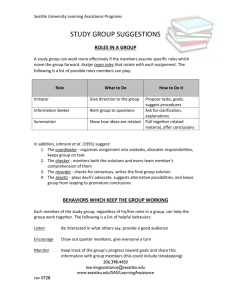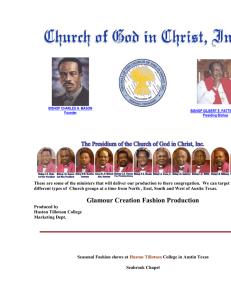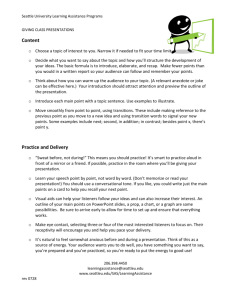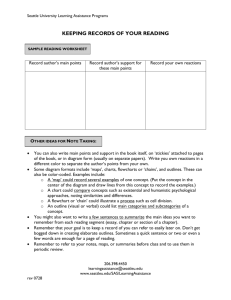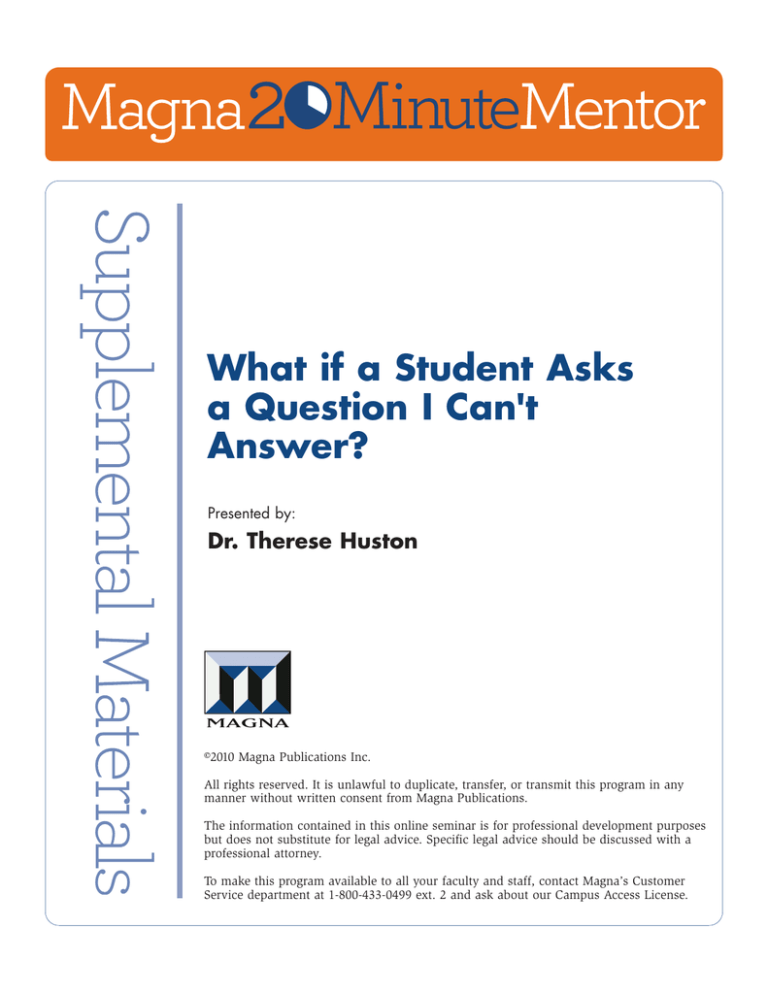
What if a Student Asks
a Question I Can't
Answer?
Presented by:
Dr. Therese Huston
MAGNA
©2010 Magna Publications Inc.
All rights reserved. It is unlawful to duplicate, transfer, or transmit this program in any
manner without written consent from Magna Publications.
The information contained in this online seminar is for professional development purposes
but does not substitute for legal advice. Specific legal advice should be discussed with a
professional attorney.
To make this program available to all your faculty and staff, contact Magna’s Customer
Service department at 1-800-433-0499 ext. 2 and ask about our Campus Access License.
WHAT IF A STUDENT ASKS A QUESTION I CAN’T ANSWER?
DO, DON’T, AND MAYBE | 20-MINUTE MENTOR | MAGNA SEMINARS |
DON’T
DO
Confirm you’ve answered the
question
“Does that answer your
question?”
Let students know if you made a
mistake
If you discover you’ve made
an error, admit it
Explain the correct answer
Point out that it’s a place
where it’s easy to get
confused and that you don’t
want them to make that
mistake
Get angry with students for
asking
It’s easy to feel flustered if
you’ve been asked several
questions in a row you can’t
answer
Take a deep breath
Joke – “I must have left my
brain at home”
Reassure yourself – if they
are asking hard questions,
you’re doing your job as the
teacher
MAYBE
Ask a student to research the
answer
Pros
Teaches students where to
find answers
Cons
Students can be discouraged
from asking questions
because it leads to homework
Alternative
Give extra credit to first three
students who send you the
answer & the source
Fake it
Students can quickly find the
correct answer, online or in
the book
Reduces credibility and
students’ confidence in you
CENTER FOR EXCELLENCE IN TEACHING & LEARNING | T 206-296-2144 | hustont@seattleu.edu
THERESE HUSTON, PHD
Ask “What are your questions?”
instead of “Does anyone have any
questions?”
Frame the question so that
the assumption is that they
will have questions
Other phrases include
o That was a lot of new
material. I’m sure
something could be
clearer.
o What we just covered
was really important.
Take a minute to
review your notes with
a neighbor and put a
star next to places
where your notes
aren’t clear. (This
usually leads to
questions)
By asking “Does anyone have
any questions?” or “Are there
any questions?” it sounds as
though you assume there will
be none
CENTER FOR EXCELLENCE IN TEACHING & LEARNING | T 206-296-2144 | hustont@seattleu.edu
THERESE HUSTON, PHD
WHAT IF A STUDENT ASKS A QUESTION I CAN’T ANSWER?
QUESTIONS FOR FURTHER DISCUSSION | 20-MINUTE MENTOR | MAGNA SEMINARS
1. When you’re teaching a course in a topic you know well, and a student asks a question you cannot answer, how do you respond?
2. Could these same responses work when you’re teaching a topic you don’t know as well? Why or why not?
3. When you’ve been a student and your professor didn’t know the answer, what responses were memorably good? Are there any
responses that were memorably bad?
4. Why might a student be pleased if you research an answer to their question and come back to the next class with an answer?
5. How do you define your role in the classroom? What role should a good teacher play? Your answers might help you develop a strategy
for handling students’ difficult questions.
6. Are there ways you could show students how someone in your discipline thinks about and answers a question? In other words, when a
chemist / anthropologist / studio artist / etc. encounters a new question, how do they find an answer?
CENTER FOR EXCELLENCE IN TEACHING & LEARNING | T 206-296-2144 | hustont@seattleu.edu
THERESE HUSTON, PHD
Recommended Resources
Publications:
CASHIN, W. E. (1995). Answering and asking questions, IDEA Paper No. 31. Manhattan, KS: Center for Faculty Evaluation and
Development, Kansas State University
HUSTON, T. (2009, July 24). How to teach what you don’t actually know. The Chronicle of Higher Education, 55 (42), A25-A26.
HUSTON, T. (2009). Teaching what you don’t know. Cambridge, MA: Harvard University Press.
HUSTON, T. (2009). Teaching by the seat of your pants. NEA Higher Education Advocate, 27(1), 5-8.
Websites:
Wei_Dai (2010, January 17). Tips and tricks for answering hard questions. Retrieved March 11 from
http://lesswrong.com/lw/1g4/tips_and_tricks_for_answering_hard_questions/
Adubato, S. (n.d.) The art of answering difficult questions. Retrieved March 11 from
http://www.caucusnj.org/adubato/starledger/difficult_questions.asp
CENTER FOR EXCELLENCE IN TEACHING & LEARNING | T 206-296-2144 | hustont@seattleu.edu
THERESE HUSTON, PHD

